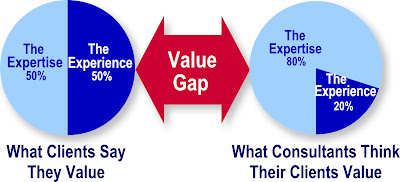As reported in their book Clientship, authors Kennedy and Greenberg asked over 500 clients this question: "If you consider that we provide you value in two ways and that together they equal 100%, how would you divide up the value between our technical skills (what we do) and our client-service skills (how we do it)?" The prevailing response was 50/50. Another way to put it is that the experience is every bit as valuable to the client as the expertise. Research within our industry by BTI Consulting and Roger Pickar came to similar conclusions.
Could these data be understating the value of the experience? I think so. Consider when your firm has lost clients. Was it because of technical shortcomings or inadequate service? When I've asked that question of principals and managers in our business, they overwhelmingly agree that it's service-related problems (70 to 90% of the time). So we get it. Right?
Not so fast, my friend. BTI asked firms to identify their primary competitive advantage. Eighty percent said it was their technical capability. Only 20% said it was their client service. We clearly place more emphasis on technical excellence than on service excellence (i.e., the client experience). That bias is evident in our business development strategies, our proposals, and our marketing materials. It's evident in the disproportionate amount of time and money we invest in technical improvement versus service improvement.
Our priorities are out of step with those of our clients. There is a substantial gap between what our clients value and what we think they value. And that gap represents an exciting opportunity to distinguish our firms. Indeed, I believe that closing that gap is the best differentiation strategy available to most A/E firms.

So where do you begin? That's the subject of upcoming posts. Next up: The prized product of the Experience Economy is what is commonly referred to as the branded experience. What is it and how do you create it? Stay tuned.





1 comment:
As the co-author of The Experience Economy, I do know that often experience trumps expertise, or are at least co-equal as your diagram has it. Even in hard-nosed B2B environments like architecture and engineering this is the case.
People want to spend time in experiences that engage them, and on the supply side, the experience IS the marketing. That is, the best way to generate demand for any offering is with an experience so engaging that customers can't help but pay attention -- and then pay up as a result by buying that offering.
Interestingly, two of our Experience Stager of the Year award winners were A/E firms! In 2005 we gave the EXPY to HOK Sport + Venue + Event for the great work they have done in creating stadiums that fans perceive as authentic. That was for *what* they did; in 2007 we gave it to TST, Inc. of Fort Collins, CO, for *how* they do their engineering work!
TST -- led by President Don Taranto and head of marketing Ed Goodman -- created The Engineerium to provide an incredibly different, engaging experience around helping clients realize their dreams ("dreamscaping" they call it). Check it out here:
http://www.tstinc.com/
and in person if you ever get the chance. TST is the shining exemplar of experiences in the A/E industry.
Post a Comment